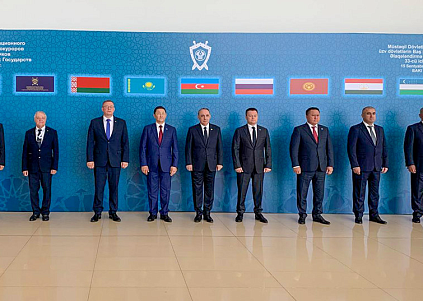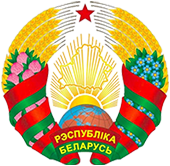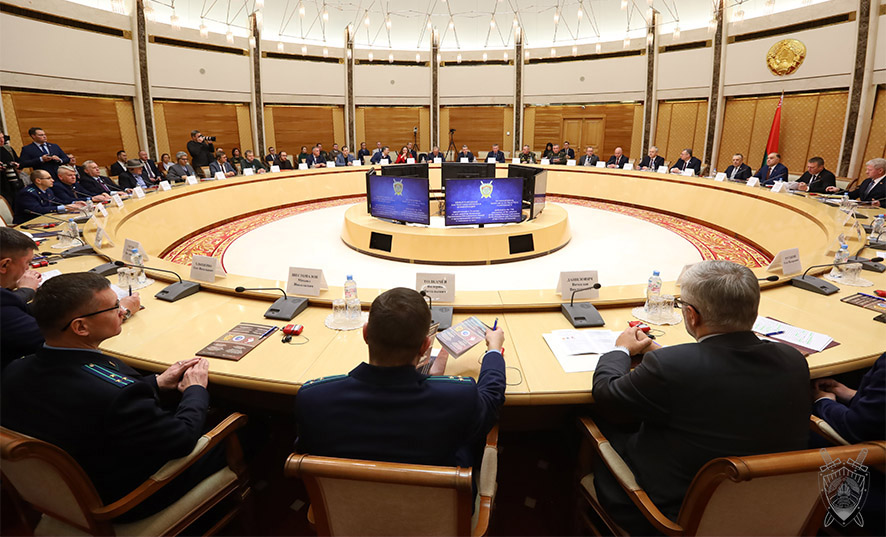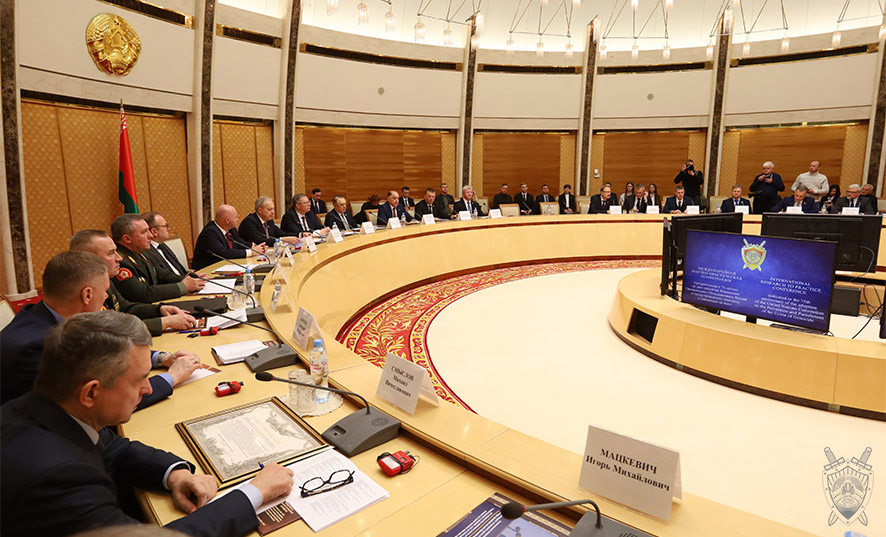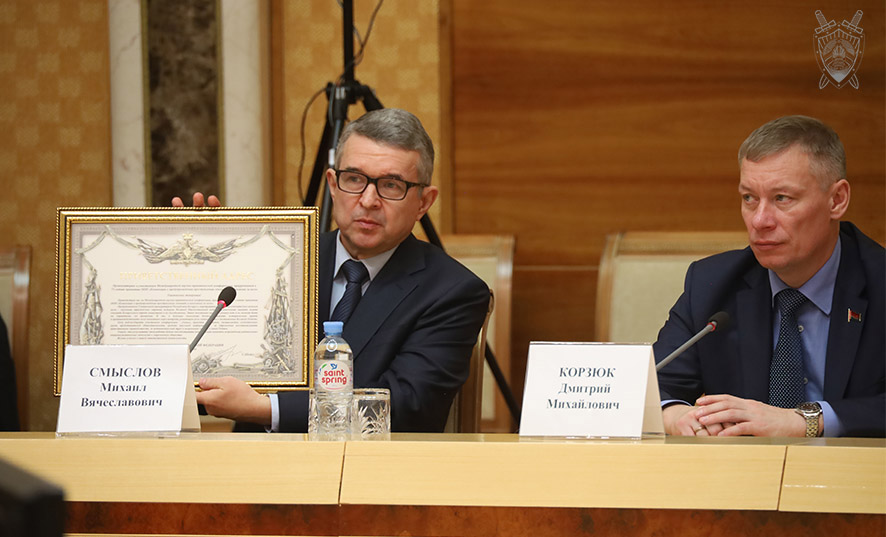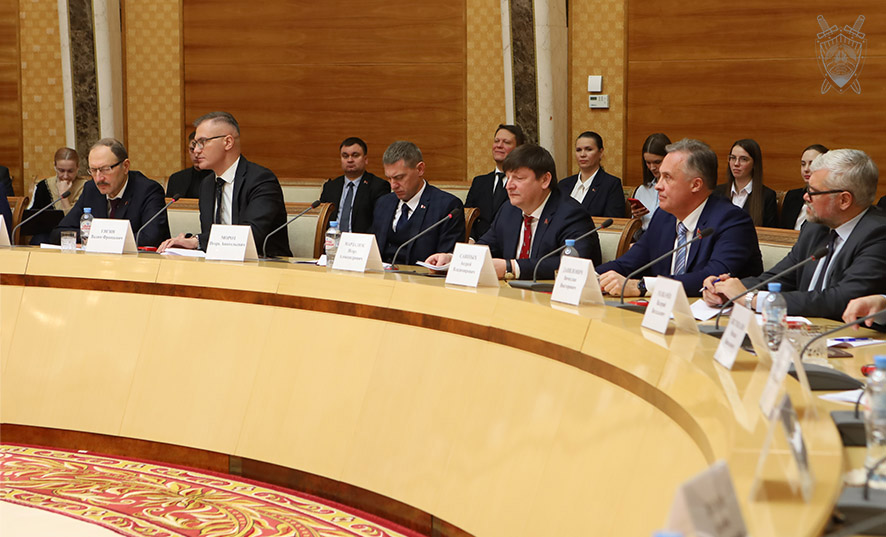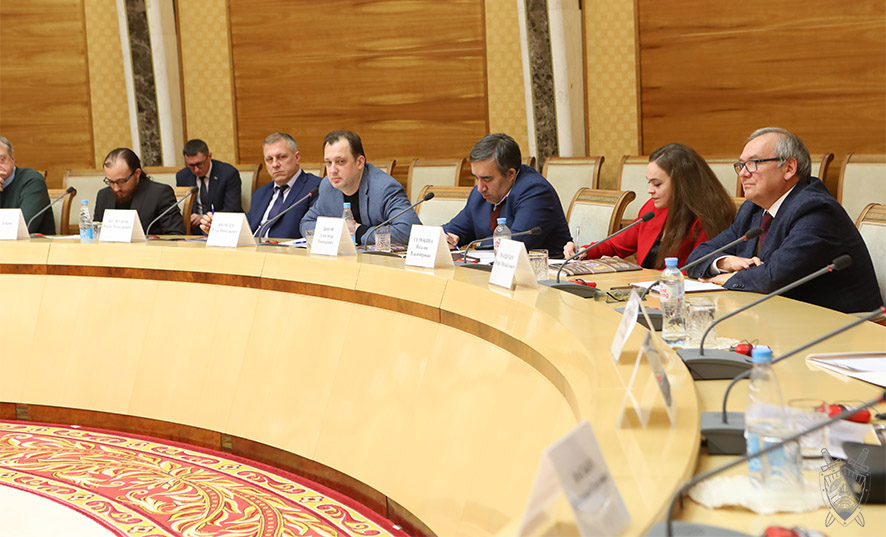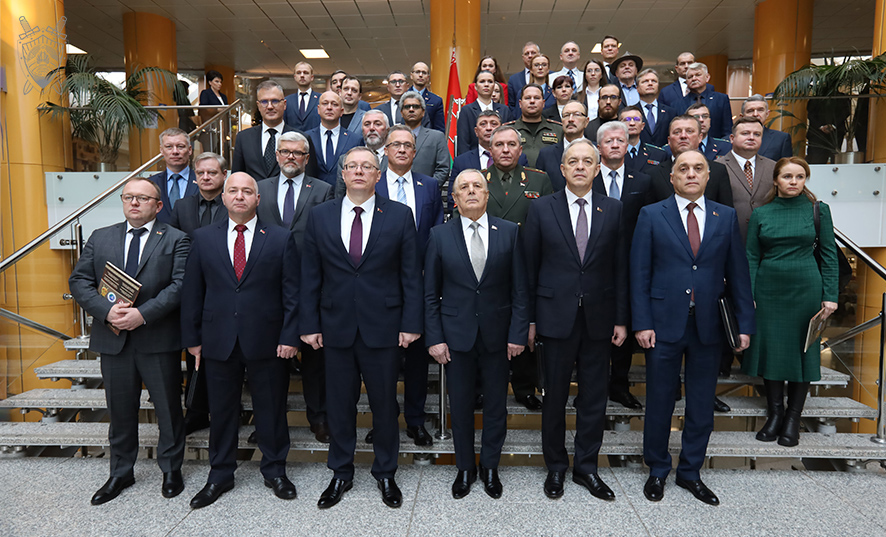The Prosecutor General’s Office of the Republic of Belarus has organized the International Research-to-Practice Conference Dedicated to the 75th Anniversary of the Adoption of the United Nations Convention on the Prevention and Punishment of the Crime of Genocide.
The conference was co-organized by the National Library of Belarus, the Belarusian State University of Culture and Arts and the National Press Center of the Republic of Belarus.
Before the beginning of the event, Andrei Shved presented the third edition “Punitive Operations. Part 1” from the series “Genocide of the Belarusian People”, prepared by the Prosecutor General’s Office. It contains information and analytical materials and documents, obtained during the investigation of the criminal case on genocide, about punitive operations on the territory of the BSSR during the Great Patriotic War. The book presents new and previously unknown to the general public materials about the planning and implementation of the policy of genocide of the Belarusian people by Nazi Germany through mass punitive operations.


Continuing, the Chairman of the Institute of Military Heritage (Lithuania) Jurijus Traksialis, presented ten volumes of the series “The Book of Remembrance. Europe”, which have been published so far and which, among other things, contain documents of the war period, topographical maps, and award documents for Heroes of the Soviet Union who received this high rank in the battles for the liberation of the Baltic states, died and were buried on the territory of these states.


Opening remarks were addressed to the event participants by the Prosecutor General of the Republic of Belarus Andrei Shved, the Chairman of the Supreme Court of the Republic of Belarus Valentin Sukalo, the Head of the Administration of the President of the Republic of Belarus Igor Sergeenko, the State Secretary of the Security Council of the Republic of Belarus Aleksandr Volfovich, the Chairman of the Investigative Committee of the Republic of Belarus Dmitry Gora, the Minister of Defense of the Republic of Belarus Viktor Khrenin and others.
Welcoming the participants of the plenary session of the conference, Andrei Shved said: “The Nuremberg Tribunal created a legal basis for conviction for crimes against peace and security of mankind. Its logical continuation was the adoption of the UN Convention, which for the first time gave a legal definition of genocide and its forms. I am confident that the conference will contribute to the establishment and preservation of historical truth.”

The Prosecutor General recalled the sense of duty and patriotism with which the Belarusians stood up in defense of their Motherland during the war years: “I would like to particularly note that during the most difficult period of the Great Patriotic War in the occupied territory of Belarus there was an irreconcilable confrontation of the Belarusian people and the German invaders and their accomplices. It was a voluntary patriotic impulse enshrining the spirit of freedom of the Belarusian people. The nationwide resistance movement aimed at the defense of the Fatherland was a significant contribution to the common struggle of the peoples of the Soviet Union against Nazi Germany and its allies. The memory of the unparalleled feat of the victorious Soviet people and the innocent victims of that war has become part of the cultural, spiritual and historical code of the Belarusians.”
The Chairman of the Supreme Court of the Republic of Belarus Valentin Sukalo emphasized that “distortion of the real war events poses a threat to peace and security of our country. The investigation of the criminal case contributes to the restoration of verity, historical truth and justice. The peculiarity of this case is that it is not simply a historical analysis and bringing individual Nazi criminals to justice, but the most complete legal assessment of the tragedy of the Belarusian people.”

The Head of the Administration of the President of the Republic of Belarus Igor Sergeenko noted the special significance of the Great Patriotic War for all humanity: “We are talking about one of the most terrible lessons in the history of mankind, which must not be forgotten. We remember what our country was turned into during the occupation – a collective concentration camp. Hitler’s Germany made big plans to clear this territory. Today, the Nazis are discrediting the history of the Great Feat of the Soviet people. But we need to remember the Great Feat and the heroes who stopped the German death machine.”

The State Secretary of the Security Council of the Republic of Belarus Aleksandr Volfovich stated that “today fascism and Nazism have become a reality again. We are witnessing the emergence of new followers of these ideologies in a number of countries around the world. Entire political regimes are trying to rehabilitate these criminals and the atrocities and crimes they committed. The collective West is purposefully rewriting the history of the Great Patriotic War, erasing the key role of the former Soviet republics in the victory over Nazi Germany.”

The Prosecutor General of the Supreme People’s Procuratorate of the People’s Republic of China Ying Yong sent a welcoming address to the participants of the conference. He expressed confidence that the event would adhere to the ideas of striving for peace and supporting each other, taking history as a reference point, looking to the future, jointly safeguarding and maintaining peace. He emphasized the special significance of the conference for the world community.
The Prosecutor General of the Republic of Belarus made a report on the investigation of the criminal case on genocide of the Belarusian people during the Great Patriotic War and the post-war period.
Andrei Shved drew attention to the fact that from the first days of the war the mass extermination of people was carried out through shootings, gallows, gas chambers, burning, famine, spread of epidemics – this was supposed to instill fear and suppress attempts to resist the occupation regime. He informed that the leaders of the Third Reich named the reduction of the Slavic population by 30 million as one of the goals of the war against the Soviet Union.

“The history of mankind has not known such a scale of extermination, in such numbers and for such a long period of time as the history of the BSSR,” he noted. “Every day we receive new indisputable evidence that practically the whole country was turned into a field of death, a huge cemetery. The fascists and their accomplices set themselves the task to completely clear up this territory from civilians.”
The Prosecutor General emphasized that the extermination of the population of the BSSR was carefully planned in advance: “Already in 1939, the Nazis created two punitive units from among Ukrainian nationalists. They underwent special training on the territory of Germany and on 22 June 1941 crossed the state border of the USSR together with the Wehrmacht. From the moment of the invasion, the Wehrmacht troops and punitive units carried out the annihilation of civilians according to pre- developed plans.”
Andrei Shved stated that “the results of the investigation confirm the thesis that Nazism is alive, it is an ideological platform and part of the state policy of the United States and the European Union towards Belarus. Knowing the truth about the period of the Great Patriotic War, it becomes clear that the forms and methods of the Nazis of the mid-twentieth century and the present day are the same.”

The representatives of the Russian Federation at the conference were Igor Krasnov, Prosecutor General of the Russian Federation, Igor Matskevich, rector of the federal state establishment of higher education “University of the Prosecution Service of the Russian Federation”, Aleksandr Zvyagintsev, Deputy Director of the federal state budget scientific institution “Institute of State and Law of the Russian Academy of Sciences”, Sergey Naryshkin, Chairman of the Russian Historical Society, Aleksandr Dyukov, Director of the foundation for assistance to topical historical research “Historical Memory”, Yegor Yakovlev, Director of the Digital History Foundation.
Igor Krasnov drew the attention of the audience to the fact that “one of the main goals of such events as today’s is to prevent the suppression and distortion of real historical facts”. Also, “any attempts to revive radical nationalist ideologies in the modern society should be nipped in the bud.”

Sergey Naryshkin in his speech emphasized: “Such events are becoming a good tradition, which testifies to the mutual need for dialogue and increased efforts to preserve the historical truth about the Great Patriotic War. One of the key topics is genocide. To this day, the tragedy of Khatyn and its sisters – villages burnt down by the enemy, which never revived – resonates with pain in our hearts.”

Representatives of other foreign countries took part in the plenary session: Oliver Schneemann, Deputy Chairman of the German political party “Deutsche Mitte”, Jurijus Trakselis, Chairman of the Military Heritage Institute, Krzysztof Tolwinski, Chairman of the “Front” political party (Poland), Lucas Leiros, Brazilian social scientist at the Federal University of Rio de Janeiro and geopolitical consultant, Dirk Pohlmann, journalist, documentarian, activist of the German public initiative “Freundschaft”, Behzad Saberi Ansari, Legal Advisor to the Minister of Foreign Affairs of the Islamic Republic of Iran.

During the break of the plenary session, the Prosecutor General of the Republic of Belarus together with other participants of the conference laid flowers at the memorial complex “Trostenets” in memory of the victims of genocide of the Belarusian people during the Great Patriotic War and the post-war period.





As part of the event, the Prosecutor General, as well as other participants of the conference, spoke to representatives of the media.
Responding to questions from journalists, the head of the supervisory agency noted that the Prosecutor's Office had sent more than 100 requests for legal assistance to almost 30 countries: “These are the countries where the punishers from SS units lived or are living. We are actively assisted by the Russian Federation, and we are in correspondence with some Latin American countries. They establish the additional information related to the circumstances of the crimes committed by specific Nazis, that is, we are engaged in a legal dialogue. As for the Baltic states and Poland, they flatly refused to provide legal assistance and stated that this was contrary to their political national interests.”

The Prosecutor General emphasized that history develops in a spiral order and now, unfortunately, there is a new round of fascism: “There is a new redivision of the world, a new expansion to the East, new attempts to seize territories and resources. The successors of fascists have raised their heads and demand revenge. It is our sacred duty to tell the whole truth about what fascism is and what terrible consequences it leads to, we must fight for the minds and hearts of our children, so that they also pass it on to their children and grandchildren. This is the key to preserving our state.
There is a war going on, that was unleashed years ago, including an information war. They are trying to strike at the root, to destroy the foundation of our society, our morality, spirituality, family values, and we must lay the foundation for the future generation to remember the feat of our ancestors in the light of recent events.”
“Today, active attempts are being made to rewrite history, to distort it. Political leaders of many states today have taken Nazi ideology as their basis, and it has already become part of their state policy. It is very important for us to prevent Nazism and fascism from raising their head in the 21st century. Therefore, our international event is designed to once again draw the attention of all people to the fact that we must never allow in our years the brown plague to lead to wars, extermination of people and rivers of blood again. We must do everything possible to ensure that our young people know the true face of fascism and Nazism, so that in the future this worst phenomenon that has occurred in the history of mankind, will never be allowed on our land", - summarized Andrei Shved.








The second day of the conference will be held tomorrow in the Sports and Cultural Centre of the Belarusian State University of Culture and Arts. Follow the conference on the official YouTube channel of the Publishing House “Belarus Today”. The broadcast starts at 10:00.
Photo: Prosecutor General’s Office
Department for Interaction
with Mass Media and Editorial Work
of the Prosecutor General’s Office
Other news
Main events

